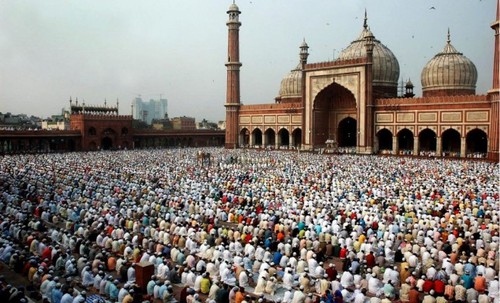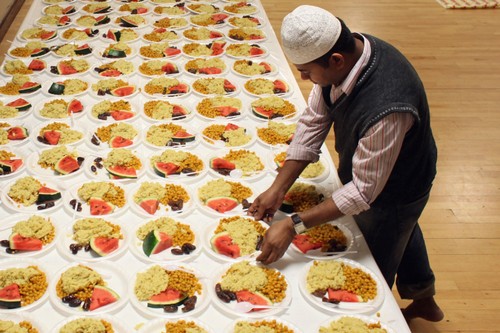Tom: Hello, Mr. Andi. Thank you very much for joining our show. As I know, the Ramadan month started last week. Could you tell VOV’s listeners about the meaning of the Ramadan?
A: There are many meanings of the Ramadan. But among others, Ramadan means “to burn”. It comes from the Arabic word derived from “Ramda”, which means “to burn”. This holy month is called “Ramadan” because it burns sins. In the month of Ramadan, a fasting Muslim holds the heat of hunger, the heat of thirst, the heat of fasting in order to burn his or her sins. That’s the first meaning of Ramadan.
But there is another meaning of Ramadan. Because it comes from the basic word of “Ramadiyu”, which means “rain” which is visible in the end of summer. Like the rain washing the surface of the earth, the month of Ramadan also purifies the believer from sins and cleanses their hearts.
Last but not least, Ramadan also means “to sharpen”. It is the month to sharpen the soul, sharpen the mind, and to sharpen the clarity of the heart.
But some other people deem Ramadan as a month of training, to keep our body healthy by eating regularly. We are also taught to be able to arrange the time, when to eat, when to work, when to rest and when to do worship. Also my children, I always taught my children to start fasting at the earliest age possible. My son and my daughter, at 6 years old, had already finished the whole fasting month. Now they are bigger and already accustomed to the Ramadan. They know what to do in Ramadan. There are a lot of things to do in Ramadan, not only fasting but also praying more than usual in the daily life.
During the Ramadan, as I mentioned before, we do not only perform prayer, fasting but also share with other people, help poor people and we must finish reading our Qur’an.
 Ramadan Prayers at Jama Masjid New Delhi (Photo:abudhabi2.com) Ramadan Prayers at Jama Masjid New Delhi (Photo:abudhabi2.com) |
Tom: As I know, during the Ramadan month, people must not eat or drink during the day, from sunrise to sunset. I wonder how they can have the energy to work the whole day. Do you have any experience of your own, or some tips that help you out during the Ramadan month?
A:
- First, to set sleep time. We have to wake up at around 2 o’clock, so we need to have enough rest.
- Do not leave Sahur. Sahur is a meal at around 3 -4 o’clock, depending on what time the Fajr prayer is. I never skip the Sahur. I have to eat before the sun rises, normally in Indonesia around 4.30.
- Drink and eat slowly during Iftar, the time when fast-breaking arrives. Because we hold the hunger, and when the Iftar comes, we eat and drink a lot. That’s not good.
- Drink water, at least 6 or 8 glasses of water during the break time.
- And we have to control emotions. This one is very important because if you get angry, you will release the energy.
 A Muslim man in London prepares plates for a community iftar during Ramadan. (Photo: Dan Kitwood/Getty Images) A Muslim man in London prepares plates for a community iftar during Ramadan. (Photo: Dan Kitwood/Getty Images) |
Tom: What happen if a Muslim does not fast or violate the regulations?
A: For Muslims who do not perform fasting or praying during Ramadan, the sins will be multiplied. The Ramadan comes only once a year, so as a good Muslim, you have to use this period as good as possible. Only one month, then you will have to wait for 11 months to meet the Ramadan again. Ramadan is the glorious month that can make a good Muslim who appreciate and spend time for worship. In accordance with the Al Qur’an, we have the reward for 80 years of worship. The reward is later, when you die, in heaven. What you do in Ramadan is like an investment. One day we leave this world, we die, of course there is another life in heaven and what we did during this life in the world will be counted, which one is good, which one is bad. It is a matter of our belief.
Tom: Is there any difference in your activities during Ramadan month in here, in Vietnam and in Indonesia?
A: In terms of time, almost the same. The difference is slight, not so much difference. The only different one that I feel from (celebrating Ramadan) in Indonesia is the situation, because I can not hear the Azan, the sound of Azan. And also the mosque is only run in Hanoi. Everything is the same. The only difference is the situation.
Tom: Apart from faith, how does the fasting month of Ramadan have an impact on yourself?
A: I think you have to be patient. The word “patient” is very important. Like in office, sometimes you have conflicts between friends, which we want to be angry, also in the road, when we have someone that wants to fight me, I just say that “I’m fasting”. That means I have to be patient. Ramadan is the month of patience.